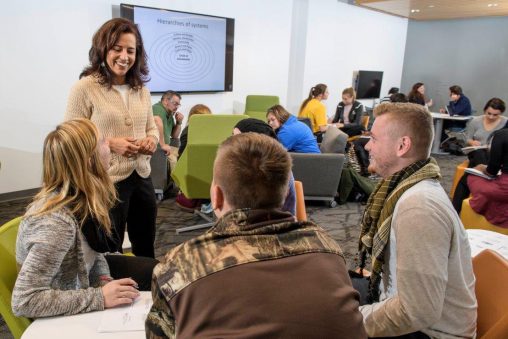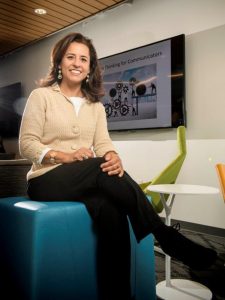
J. Alex Alexander, a senior lecturer in the Department of Communication, works with students in her Small Group Communication class in the New Media Incubator. (Photos by Erin Pence)
The first thing the Small Group Communication class does in the New Media Incubator on this particular day is sing “Happy Birthday” to Colton because the students are as much a family as they are a class.
Then it really starts to get fun, with a lesson in systems.
The 21 students are asked to place their hands on their hearts to feel their cardiovascular and respiratory systems. They are then asked to come up with a list of ingredients for brownies to see how the quality of a single ingredient can affect a system.
Finally, they split up into brainstorming groups to identify as many systems as they can think of. A dry-erase wall gets a workout. And the ideas spill out of the students in a torrent, a river.
“Circulatory systems,” “the military,” “car engines,” “colleges,” “prisons,” “drug cartels” and finally one that draws cheers — “the solar system.”
In the eye of the storm is J. Alex Alexander, a senior lecturer in the Department of Communication and the orchestra leader in this symphony of learning. She jokes, enthuses, cajoles, gesticulates. She bobs and weaves around the classroom, locking eyes with each of her students. She watches her class master brainstorming.
“Now that they’ve got it down, it’s such a clean process,” she said. “They will listen to everybody’s ideas. They don’t judge any of them. They’re encouraged to be as wild and crazy as possible to encourage creativity.”
Alexander believes that much of the creativity and knowledge-building is fostered by the space the students are in — the New Media Incubator in the Tom Hanks Center for Motion Pictures.
“Creativity is about being bold and taking chances, and we’re trying new things here,” said Will Davis, the incubator’s manager and an instructor in the Department of Communication.

J. Alex Alexander believes that spaces like the New Media Incubator foster creativity and knowledge-building in students.
The incubator, which opened in the fall, provides meeting areas, a computer lab and studio space to make it easy for students in the Motion Pictures Program and from the Department of Communication to work together.
A computer lab is available for digital editing, creating motion graphics and publishing work online. The incubator boasts a working television and film studio with professional cameras. In the neighboring control room, students can manipulate and monitor studio events.
“So much learning is done online now that if we’re going to ask students to be present with us, we have to make it worth their while,” said Davis.
The incubator also includes open space where students can get together and talk about their creations. That space is lounge-like, with small glass tables and green, gray and orange chairs on rollers. Purses and bookbags carpet the floor, slipping off the shoulders of students as if they’ve just arrived home from school.
“I do think this space makes a gigantic difference,” said Alexander. “The comment I hear most often from students is they don’t feel like they’re in class. This is a place for them to come, relax, and they learn.”
Amani Aldayel, a communication studies major from Saudi Arabia who wants to go into public relations, said the informality of the class helps her learn. And she has made many friends due to the interactivity.
“When I’m in this class, I don’t feel like I’m in class. I feel like I’m just hanging out with friends,” she said. “And I’ve become more creative. My ideas come really fast.”
Alexander teaches teamwork, identifying and achieving group goals, facilitation, consultancy, how to listen and how to join thoughts together to create a new idea.
“They are learning how to think big-picture about communication but also keep their feet on the ground with solid teamwork skills,” she said.
In addition, the class prepares students to be critical consumers of information and to understand the global nature of communication.
“We are bombarded by information constantly,” said Alexander. “And in our global economy, we have folks that have different cultural systems of communicating. In order to be culturally competent as a communicator, you need to have a bigger, broader perspective of knowledge and skills.”
Alexander grew up in Yellow Springs. She received her bachelor’s degree in communication and her master’s in counseling from Wright State and then joined the faculty in 1997.
“I’m a process person. I believe communication is the route to help people help themselves,” she said. “I want to get students to expand their minds even more than they thought they were capable of. So teaching has definitely been a place I’ve felt most at home.”
Alexander’s students’ majors range from communication studies to mass communication to organizational leadership to social work. They are interested in careers in television, radio, public relations, business, human resources and nonprofit work.
Colton Risner, an organizational leadership major from Covington, Ohio, said it is the most interactive and impactful class he has ever taken. He said he retains more knowledge through conversation than listening to a lecture.
“It’s just a different atmosphere, especially for learning,” he said. “You bounce ideas off of each other. Somebody may say something and I will ping off of that and then somebody will ping off of me. It allows learning to thrive.”

 Wright State University Foundation awards 11 Students First Fund projects
Wright State University Foundation awards 11 Students First Fund projects  Gov. DeWine reappoints Board Treasurer Beth Ferris and names student Ella Vaught to Wright State Board of Trustees
Gov. DeWine reappoints Board Treasurer Beth Ferris and names student Ella Vaught to Wright State Board of Trustees  Joe Gruenberg’s 40-Year support for Wright State celebrated with Honorary Alumnus Award
Joe Gruenberg’s 40-Year support for Wright State celebrated with Honorary Alumnus Award  Wright State’s elementary education program earns A+ rating for math teacher training
Wright State’s elementary education program earns A+ rating for math teacher training  Wright State’s Calamityville hosts its largest joint medical training operation
Wright State’s Calamityville hosts its largest joint medical training operation 